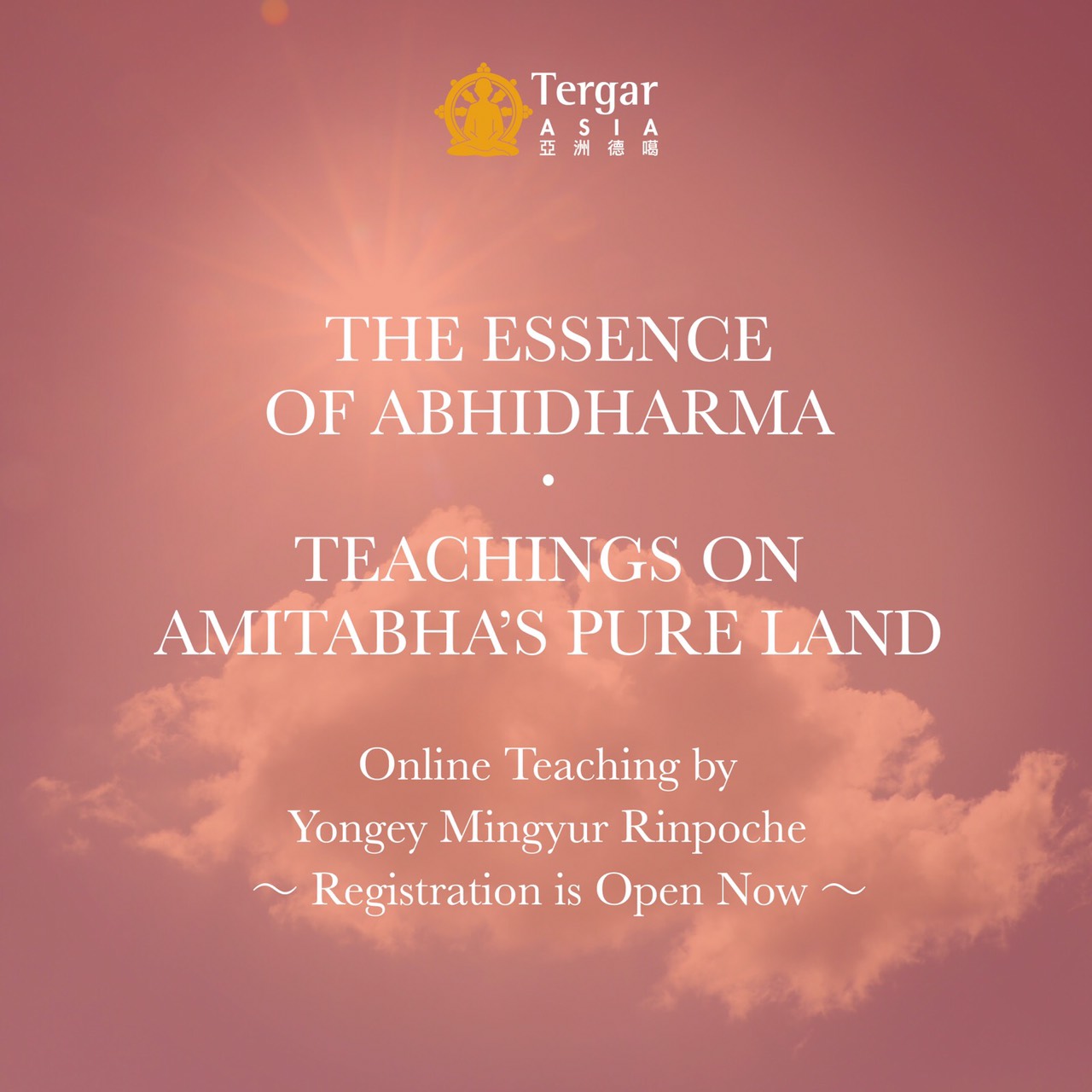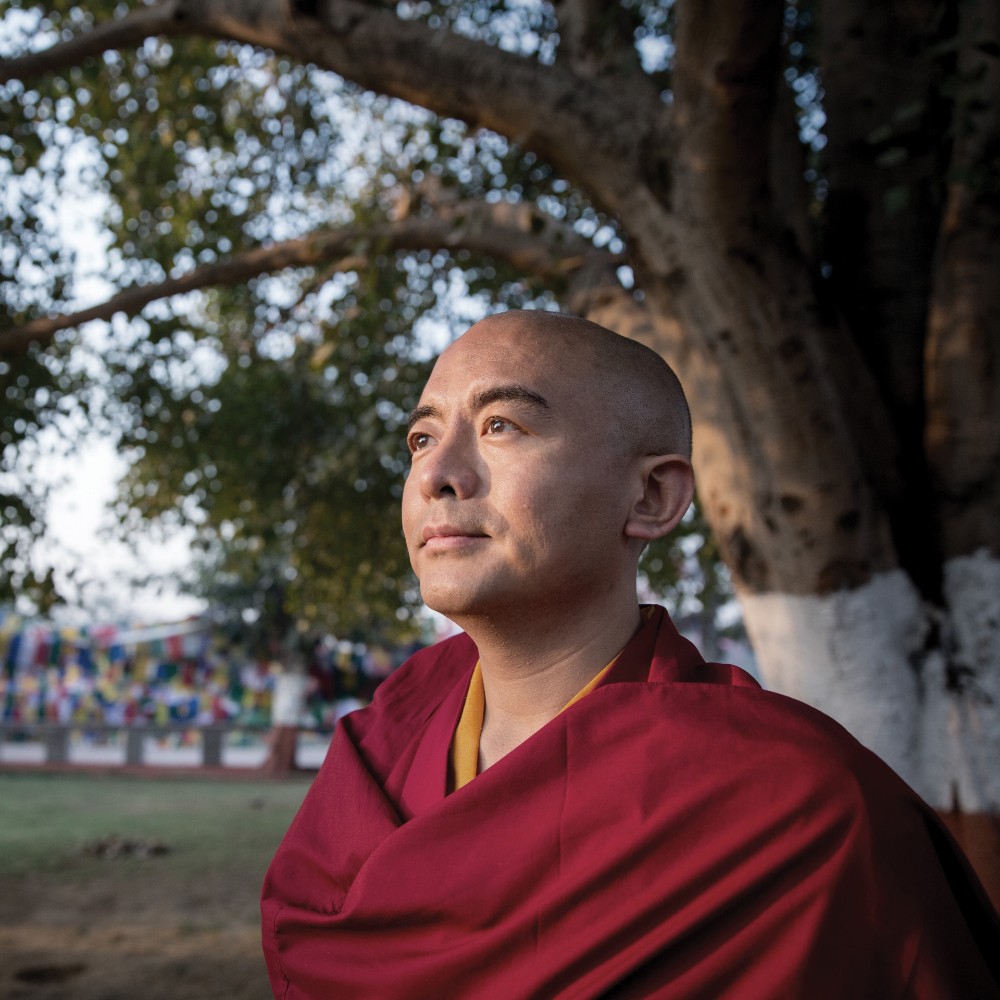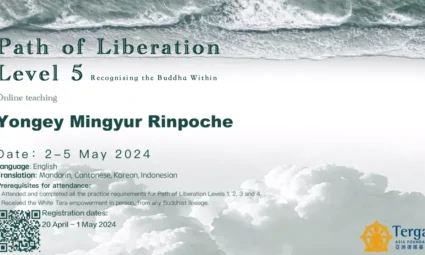Online Dharma Course
with Yongey Mingyur Rinpoche
Programme
The Essence of Abhidharma
![]() Oct 8-11
Oct 8-11
![]()
In ancient times, the Basket of Higher Doctrine was transliterated as Abhidhamma or Abitan (“higher doctrine”) Pitaka (“basket”). Together with the Basket of Discourse (“Sutta Pitaka”) and the Basket of Discipline (“Vinaya Pitaka”), the Abhidhamma Pitaka is one of the three divisions that made up the Tipitaka, the three baskets of Buddhist scriptures.
What does Abhidhamma mean? Abhi means higher, supreme, excellent. Dhamma means dharma. While dhamma has different meanings, here it refers to the teaching of the ultimate truth, which specifically means the Dharma as taught by the Buddha.
The Abhidhamma Pitaka is a collection of canonical texts that sets out the essential teachings of the Buddha in a precise and systematic way, the result of attempts to organise and interpret the Buddha’s many teachings. It includes the four complete expositions of life from the relative level to liberation – the mind, mental factors, formation and nirvana. The Abhidhamma Pitaka clearly expounds the preliminary preparatory work, the study and practice of methods, and each stage of Buddhist practice. As such, it is the quintessential functional “map” for the study and practice of Buddhism.
This is the first time Mingyur Rinpoche will teach these key Buddhist texts outside the monastery. In this course, Rinpoche will share the essence teachings of Abhidharma over four sessions.
Registration for this event has closed.
Teachings on Amitabha’s Pure Land
![]() Nov 26-29
Nov 26-29
![]()
Many Buddhists’ goal of practice is to be reborn in Dewachen – the Pure Land of Buddha Amitabha. What does one have to do to be free from samsara and get to the Buddha Land of Supreme Bliss? What aspirations must one make to connect with the Pure Land that’s the fruition of Amitabha’s great aspirations?
Join us for Mingyur Rinpoche’s teaching on Amitabha practice to discover the pathway to being born in the Pure Land.
![]() These courses are open to all.
These courses are open to all.
![]()
Mingyur Rinpoche will teach in English. Translation will be offered in Chinese Mandarin, Cantonese, Japanese, Korean, Bahasa Indonesia, Thai, Italian and French.
Course Time
Teachings for both courses will be held in the evening, daily from 19:30-21:15 (Beijing/Hong Kong/Taiwan time).
FEES
Both courses are offered free of charge. We are grateful for the support of everyone who made it possible.
FAQ
What software do I need to attend the online retreats/courses?
The retreats and courses will be hosted on Zoom. If you have not used Zoom before, please take a moment before the retreat begins to download, install, and familiarise yourself with the software.
Download the Zoom app here, and visit its FAQ page. Take the Zoom test well before the retreat begins to make sure you have the most updated version of the software and that your equipment and connections work properly.
To attend the teaching and practice sessions, log into Tergar Asia’s learning website using the personal link emailed to you, click the Join button, and log into your Zoom account when prompted.
Q: How do I know I have successfully registered for the retreat/course?
A: We will send you a confirmation email within two days of your registration. The confirmation email will contain a personalized link that you can use later to access the Tergar Asia Learning page, which will contain a link to access the retreat and other course information.
If you don’t receive the confirmation email within two days, please write to us with the name and email address you used for registration:
JOL registration enquiries: retreat@tergarasia.org
Dharma courses registration enquires: dharma@tergarasia.org
POL registration enquiries: pol@tergarasia.org
Q: How do I attend the retreat/course after registration?
A: Please retain your confirmation email and keep it safe. Before the course starts, use the personalized link contained in your confirmation email to access the Tergar Asia Learning page.On this page, you will find information on the enrolled course(s), and the link to access the event (the Zoom webinar will be open 15-30 minutes before the session begins).
Information on Registration
Registration for Teachings on Amitabha’s Pure Land will close on Nov 23.
We welcome any support for Tergar’s work to make these dharma teachings more widely available to others. Any queries about donation should be directed to: donation@tergarasia.org
ABOUT MINGYUR RINPOCHE
Yongey Mingyur Rinpoche possesses a rare ability to present the ancient wisdom of Tibet in a fresh, engaging manner. His profound yet accessible teachings and playful sense of humor have endeared him to students around the world. Most uniquely, Rinpoche’s teachings weave together his own personal experiences with modern scientific research, relating both to the practice of meditation.
Born in 1975 in the Himalayan border regions between Tibet and Nepal, Yongey Mingyur Rinpoche is a rising star among the new generation of Tibetan Buddhist masters. From a young age, Rinpoche was drawn to a life of contemplation. He spent many years of his childhood in strict retreat. At the age of seventeen, he was invited to be a teacher at his monastery’s three-year retreat center, a position rarely held by such a young lama. He also completed the traditional Buddhist training in philosophy and psychology, before founding a monastic college at his home monastery in north India.
In addition to extensive training in the meditative and philosophical traditions of Tibetan Buddhism, Mingyur Rinpoche has also had a lifelong interest in Western science and psychology. At an early age, he began a series of informal discussions with the famed neuroscientist Francisco Varela, who came to Nepal to learn meditation from his father, Tulku Urgyen Rinpoche.
Many years later, in 2002, Mingyur Rinpoche and a handful of other long-term meditators were invited to the Waisman Laboratory for Brain Imaging and Behavior at the University of Wisconsin, where Richard Davidson, Antoine Lutz, and other scientists examined the effects of meditation on the brains of advanced meditators. The results of this groundbreaking research were reported in many of the world’s most widely read publications, including National Geographic and Time.
Currently, Mingyur Rinpoche teaches throughout the world, with centers on four continents. His candid, often humorous accounts of his own personal difficulties have endeared him to thousands of students around the world. His best-selling book, The Joy of Living: Unlocking the Secret and Science of Happiness, debuted on the New York Times bestseller list and has been translated into over twenty languages. Rinpoche’s most recent book is In Love with the World: A Monk’s Journey Through the Bardos of Living and Dying, a rare and intimate account of his near-death experience and the life-changing wisdom he gained from it.





